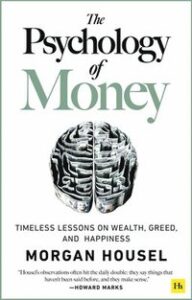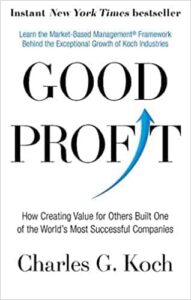Introduction
This book talks about the psychology and relationship humans have with money. It will explain why we behave and think the way we do when dealing with money, both when we earn and lose it. It is a short book that includes a lot of useful tips and lessons on how to deal with money.
This book does not give any specific financial advice but it explains the mindset we should have when investing money. This mindset will give us a higher chance of financial success in the long run and overall happier. It is shown that a lot of our financial success depends a lot on our ability to manage our emotions and impulses.
1. No One’s Crazy
The relationship we have with money and investing is based on our previous experiences. It is very difficult to recreate the feeling of fear and uncertainty in the market and some things have to be experienced to be understood. For example if you invested in the stock market during the financial crisis in 2008 then you identify investing as something risky. While if you invested between the year 2010 to 2019 in the stock market then investing is a safe and stable place to make money. So it is recommended to not judge a persons financial decisions since we have all had different experiences investing.
2. Luck & Risk
Most of financial success and failure involves luck and risk. We should be mindful of who we look up to and down on since luck plays a big part. When comparing, we should focus less on specific individuals and more on broad patterns since these are easier to replicate.
3. Never Enough
The hardest financial skill is getting our financial goal to stop moving. There are a lot of millionaires who have lost everything because they felt what they had was not enough. This is often the result of comparing themselves with other people too much and taking on risky investments. The lesson we can learn from these losses is that you shouldn’t risk what you have and need for what you don’t have and don’t need.
We must be able to say “enough” and realise that enough is not too little. Life isn’t fun without a sense of enough. There are things not worth risking for more money such reputation, health, family and freedom.
4. Confounding Compounding
When investing, time and compound interest are your best friends. If a small amount of money compounds over decades it will turn into a large amount. Many people think that rich people have special investing skills but their real secret is time. Time in the market has allowed forcompound interest to take place. Good investing isn’t about getting the highest returns but rather earning good returns over a long time.
5.Getting Wealthy vs Staying Wealthy
Getting money and keeping money are two different skills. Getting money requires risk taking and putting yourself out there. Keeping moneyrequires fear of not losing it all, caution and not being greedy. The key to a successful investment is survival, meaning you have to survive long enough to let compounding work. You wanna become financially unbreakable, meaning that your losses will not put you out of the game.
6. Tails, You Win
A lot of rich people obtained their wealth through one-in-a-million events, so called tail events. These tail events have a huge impact and are often what drives the markets. Because of all the attention they get we often forget how rare theses events are. If an investor can play out these events well, they will be successful even if they are wrong half the time. What is important is how much money you make when you are right and how much you lose when you are wrong.
A good investor is a person who can stay calm and do the average things when everyone around are going crazy.
7. Freedom
Money’s greatest power is that it gives you control over your time and freedom. Happiness is the ability to do what you want, when you want, with who you want, for as long as you want. You wanna be able to wake up and say “Today, I can do whatever I want”. Having flexibility and control over ones time is much more valuable then earning an extra 5% if the cost is working long hours which negatively affects your health.
Using money to buy time and options give benefits few luxury items can do. A small amount of money gives you the ability to take a few day off without having to worry about your bills. Having a one year emergency fund means not having to worry about getting laid off since you can just find a new job during that time. Even more money means you can take a lower paying job that has better benefits such as flexible hours and shorter commute.
8. Man in the Car Paradox
People buy expensive things because they want others to like and admire them. But what really happens is that other people only admire the things and not the person. They imagine themselves having that thing or object.It is important to understand that no one is as impressed with our possessions as much as we are. A better way to get admiration is through humility, kindness and empathy.
9. Wealth is What You Don’t See
We should stop judging people’s wealth by what we see because a persons true wealth is what we don’t see. Those who don’t buy things now and save it for later will stay wealthy longer. The only way to be wealthy is to not spend the money we have. When people they want to become a millionaire, what they really mean is that they want to spend a million dollars, which is the direct opposite of a millionaire.
Rich means having a high income and wealth is the income not spent. The world is filled with people who look modest but are wealthy and people who look rich but have no savings. It is in general easy to spot a rich person because of the things they have. Wealth is all the luxury things not purchased. Wealth provides flexibility, options and time later on in life by sacrificing the now for the future.
10. Save Money
When creating wealth, our income and return on investment are less important than our saving rate. We can create wealth without a high income not without a high savings rate. The income we have is mostly out control but our savings rate is fully within our control. The key to getting a high savings rate is to lower our expenses. Spending money on expensive things that are not needed is mainly because we want to show off that we have money. So a good way to increase our savings rate is to increase our humility.
In general we shouldn’t need a reason to save more. Saving money can be seen as a safety measure against unexpected things that can happen in life. Having money in the savings accounts can reduce stress and worries.
11. Reasonable > Rational
A rational investor makes decisions based on facts, data and statistics. A rational investor often make changes to their plans which can lead to burn out. A reasonable investor makes their decisions together with other people and includes their feelings. A reasonable investor are more likely to stick with their strategies.
Our investments should be based on our financial goals and our financial goals should be based on what we need. A good investments plan is one that allows you to sleep without any worries at night. It gives reasonable returns without having any negative effects on the quality of your life.
12. Surprise
A lot of people rely too much on historical data when making decisions. This can lead to big mistakes because the world is constantly changing through innovation which affects the financial markets. History can be a misleading guide and our decisions should not be based on the past. The past does not equal the future. “Things that have never happened before happen all the time.”
13. Room For Error
Always leave room for error when estimating the return on our investments. For example we can expect that our returns will be one third lower than the average, that way we won’t be surprised when it happens.
Avoid single points of failure. This means we shouldn’t rely on only one financial source, because if it breaks we are gonna be in a difficult situation. For example if a person is living paycheck to paycheck then they are fully depending on their job. Another example is investing everything we have into one stock.
“Planning is important, but the most important part of every plan is to plan on the plan not going according to plan”.
14. You’ll Change
It’s difficult to make long term financial plans because peoples goals and priorities change over time. Most people are aware of how much they have changed over the last years. The mistake is that they underestimate how much they will change in the future. It is very common for people have many different job careers during their life because of how much they change.
Because we we are bad at predicting our future selves, we should avoid extreme assumptions when it comes to financial planning. For example in the future our spending will be very low so we don’t need to save. Or in the future I will be happy living on a very low income. It’s always a good idea to prepare for the unknown.
15. Nothing’s Free
Most investments don’t give immediate returns. Our view when investing should be optimistic long term and prepared short term. This means we have to understand that there will be small price swings along the way. The price of being in the high return markets are volatility, fear, uncertainty and regret.
To make it easier to deal with marketvolatility we can change our mindset. Instead of viewing it as a loss every time the price goes down we should instead view it as a fee for being in the market. This fee is the price we pay to get our high returns though compounding. So we ask ourselves if this fee, both financially and emotionally, is worth it.
16. You & Me
Most people have different strategies when investing. Short term day trading and long term holding are two different games. We should in general avoid taking financial advice from people who play different games.
Bubbles in the market form when long term investors become more short term.
17. The Seduction of Pessimism
- Extremely good or extremely bad circumstances in the market rarely stay for long.
- Pessimism get more attention than optimism. If someone says that the stock market will crash he gets a lot of attention.
- Progress happens too slowly to notice, but setbacks happen too quickly to ignore.
- Two topics that affects everyone is money and health.
- Most people who have a financial plan should be optimistic about their financial future because for most people it gets better over time.
18. When You’ll Believe Anything
The more we want something to be true, the more likely we will believe a story that verifies it. This means that we can often tell ourselves the stories we want to believe which can have a large impact on our investments.
When we look back at our past experiences we can often create stories about why things happened the way they did. These stories make us feel like the world is understandable and we are in control. The problem is that there is a change that these stories are just random guesses based on what we want to believe. When creating these stories we often don’t include luck. So in general we should avoid these kind of stories and just accept that the world is uncertain and be better prepared for it.





